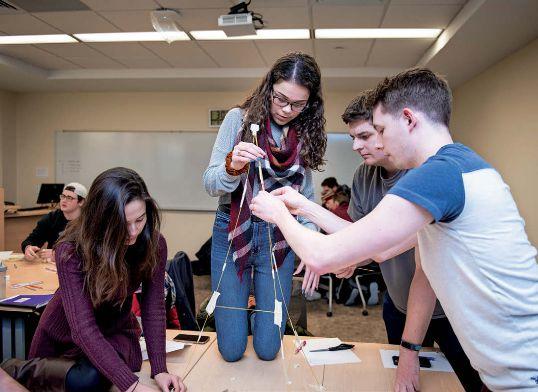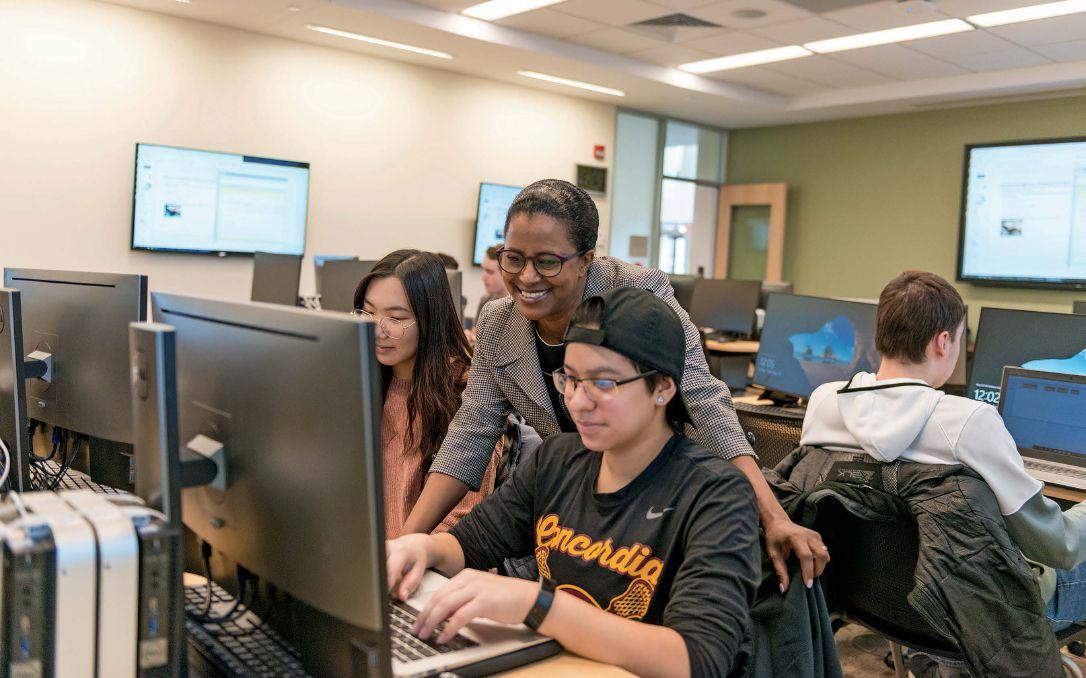
5 minute read
An Entrepreneurial mindset
Some colleges and universities say one trend in higher ed is helping students to develop entrepreneurial skills
By Andrew Weeks
Dr. Josh Behl spent about 20 years in business before refocusing his career. Now, after seven years at Minnesota State University, he still considers himself new to academia.
Behl is Dean of the College of Business, Analytics, & Communication, and in the time he’s been at the university he’s taken his expertise to the classroom and continued to forge relationships with the business community. In doing so, he’s learned about workforce needs in the region.
What he’s learned are things similar to what other colleges and universities are noticing with regard to workforce demands. Basically, employers want to hire people who are innovative thinkers and doers.
“What employers are asking for more and more is an entrepreneurial mindset,” he said. “They want people who are good problem solvers, people who take initiative.”
One of the reasons, he said, is because employers are seeing many of their long-time team members retire, those who have extensive institutional memory and experience. As the exodus continues, those workforce needs will continue to be elevated and, perhaps, shifted.
“Employers can’t expect everyone to have 30 years of experience. That’s just unrealistic,” Behl said. “And so the best they can ask for when they hire a lot of these students is to say they want someone with an entrepreneurial mindset. It comes down to how a person goes about problem solving, and taking risks, and identifying opportunities to be self-driven, to try to be a self starter. I think that entrepreneurial mindset encapsulates that quite a bit.”
A second thing many businesses are looking for these days are people who can “tell the story of data.”
“That’s a phrase I hear a lot from employers,” he said. “They want people who can look at a bunch of data, make sense of it, and then provide insights into what it tells them about their organization. What does this tell us about where we need to go, what we need to be doing, when to stop doing something and what we should continue doing?”
But there’s also a third thing employers want: people who are not intimidated by technology.
Learning to be innovative
At Concordia College, also in Moorhead, the school’s business program is one of its most popular and continues to attract new students near and far every year.
Chris Mason, dean of the Offutt School of Business and an associate professor of finance at the college, said the school goes a long way in helping students develop the entrepreneurial mindset.
“We do not offer a major in entrepreneurship,” Mason said, but noting the school does have an entrepreneurial mindset certificate. “All students have to have an entrepreneurial mindset in the way they approach challenges and obstacles and not just in business.”
Thinking like an entrepreneur — being innovative and willing to consider ideas outside the traditional box — is something that will help students be successful not only in college but in their careers. Whether as a manager or supervisor, tackling problems for an employer, or starting one’s own business, it’s that mindset that elevates the experience and makes the challenges worthwhile.
Mason said about 40% of students in Concordia’s entry-level entrepreneurship program are non-business majors. It teaches leadership skills, allows students to think critically and creatively, and, because everything is not scripted for them, Mason said, how to problem solve.
Employers clearly want more “advanced quantitative skills,” he said. “For instance, marketing for decades has been mostly around general advertising and general promotions, but with technology it has developed the ability now to very specifically target a market and it is critical in that circumstance. In that case you need to understand marketing analytics. The need for a quantitative skill set in virtually all the disciplines has advanced over the past several years.”
Challenges and opportunities
Something similar is seen at North Dakota’s Minot State University, which has an entrepreneurial program and wants its students to think like an entrepreneur.
Dr. Artresa “Tracey” Mays, assistant professor of entrepreneurship and management in the Business Administration Department, helped start the program in 2018.
When the pandemic was declared, she patted her team on the back: They had been offering virtually classes a year before COVID-
19 hit the headlines. It was a good teaching lesson for Mays: She has to be innovative if she is to properly teach it to her students.
“That’s part of what I do as an instructor of entrepreneurship, talking about innovation on a daily basis,” she said. “But I can’t teach my students about innovation if we’re not doing it and we’re not showing them how to do it.”
When she saw some business struggle to go virtual, she said her students didn’t understand the challenge the businesses were facing.
“My students were like, man, we’ve been doing virtual for a year. What’s the problem?” Mays said. “It’s been interesting to see others not be able to respond well to trends or even businesses trying to figure out all of a sudden on March 15 what they needed to do.”
She said organizations fare better when they have entrepreneurial minds on board and who themselves are innovative, because when challenges arise they are better able to adapt to possible changes. In some cases, like her department, they may be ahead of the curve.
“But the ones that were slower to respond didn’t seem to have a culture of entrepreneurship in their organization and it showed,” she said.
Likewise, Mays is trying to stay ahead of workforce topics as she helps prepare students for careers in business, be that working for a small company or corporate entity or starting one’s own business.
Minot State also has a degree in management information systems, which Dr. Serena Pontenila, assistant professor with the Business Information Technology department, said is a popular and important program at the school.

“It’s a degree that leaves a lot of opportunity for people because it does allow for people to be more technical,” she said. Students learn about cybersecurity and database management, among other things. “We face challenges, especially since last year, when we had to go fully remote. We use the same tools that industry is using, and now we’re teaching them as well. I have my undergraduate students on the same platform that I used in industry and I’m helping them develop and learn about best practices for using them.”
That fits well with what Behl mentioned he’s heard from employers about wanting people who understand data and are not being intimidated by technology.
“I think underneath (the surface layers) there is a deeper need around being able to learn new technologies,” he said. “One of the things that is happening in the workforce and in the world in general, as we all know, is the pace at which innovation and emerging technologies is moving. It is fast, in some disciplines faster than others. … And so to train a student on the latest emerging technologies is a big one. But the more important underlying skill is the ability to learn technology. It’s my belief that that’s actually a skill in and of itself, and you do that through getting exposed to technology. It’s the ability to say OK, here’s how I’m going to connect my previous experience to this new thing and make sense of it very rapidly.”
That’s what employers want, he said.
“I think this generation of students have been leveraging technology as a tool, but it doesn’t mean that they’re 100% well versed in it. I think they are primed to have the potential to be, to learn technology very easily if we in higher education can really direct them and give them the opportunity to do so.”










